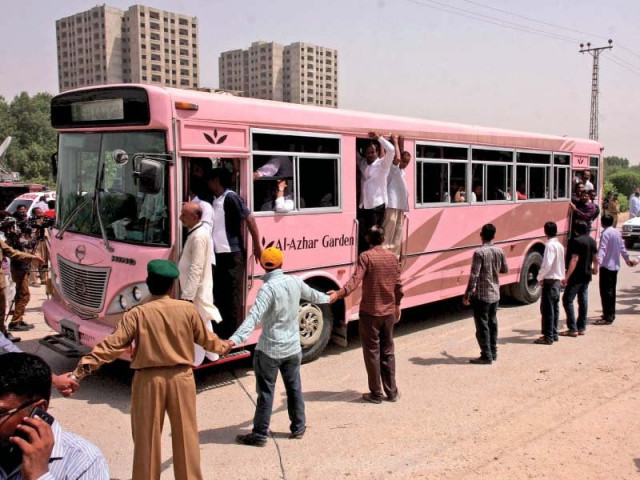Safoora carnage: Saad Aziz, four others challenge death sentences
Military court awarded capital punishment to convicts on May 12 last year

A human chain was formed to protect the bus carrying bodies of 45 people who died during the Safoora carnage in May 2015. PHOTO: FILE
A two-judge bench, headed by Justice Zafar Ahmed Rajput, issued on Monday notices to the defence and interior ministries, the provincial advocate-general and prosecutor-general to file their comments by January 16.
The Islamic State-inspired group of youths had shot dead around 45 members of the Ismaili community in the outskirts of Karachi in May, 2015.
A military court had awarded capital punishment in the case to Saad Aziz alias Tin Tin, Tahir Hussain Minhas alias Sain, Asadur Rehman alias Malik, Mohammad Azhar Ishrat alias Majid and Nasir on May 12 last year.
However, the court acquitted three others - former Fishermen Cooperative Society deputy director Sultan Qamar Siddiqui, his younger brother, Muhammad Hussain Siddiqui, and Naeem Sajid - of the charges of facilitating the massacre.
The five convicts filed their appeals through Advocate Hashmat Ali Habib, who argued that the appellants were tried before the military court, which was set up at the Malir cantonment under the Army Act, as part of Islamabad's National Action Plan.
The appellants were kept in Karachi's central prison where they were provided with an appeal format to be filed before the Registrar Court of Appeals, Judge Advocate-General of the General Headquarters of Army, said Advocate Habib.
He informed the judges that on August 15, the appellants were informed that their appeals had been rejected on July 25. They moved appeals in the Lahore High Court, which on October 3, 2016, also turned it down on the matter of maintainability since the offence was committed and the trial was conducted within the jurisdiction of SHC.
Advocate Habib argued that the conviction judgment passed by the military court was not maintainable in the eyes of law as the petitioners could have not been in custody of the military authorities and tried under the Pakistan Army Amendment Act (Act-II of 2015) or the Protection of Pakistan Act, 2014, which now stands expired. Further, the petitioners did not belong to any terrorist organisation or terrorist group using the name of religion or sect or raised arms or wage war against Pakistan as decided by a joint investigation team.
He contended that the petitioners were illegally tried and that, too, in the absence of any counsel, which was a violation of Article 10 of the Constitution, as they were also kept incommunicado during their trial and investigation. Thus, their conviction is liable to be set aside, he added.
The lawyer claimed that the petitioners' right to fair trial under Article 10-A has also been violated and that the Supreme Court had also held in one case that an accused cannot be denied meeting with family under Note 7 that was added to Section 73 of the Pakistan Army Act.
The apex court had also remanded back petitions of many convicts who had challenged their conviction by military courts to the relevant high courts over the same concerns, said Habib. Therefore, he pleaded that the court call record and proceedings of the military court trial for its perusal, set aside the petitioners' sentences and acquit them.
Published in The Express Tribune, January 3rd, 2017.



















COMMENTS
Comments are moderated and generally will be posted if they are on-topic and not abusive.
For more information, please see our Comments FAQ